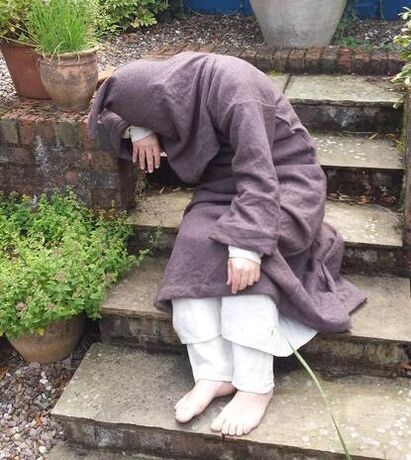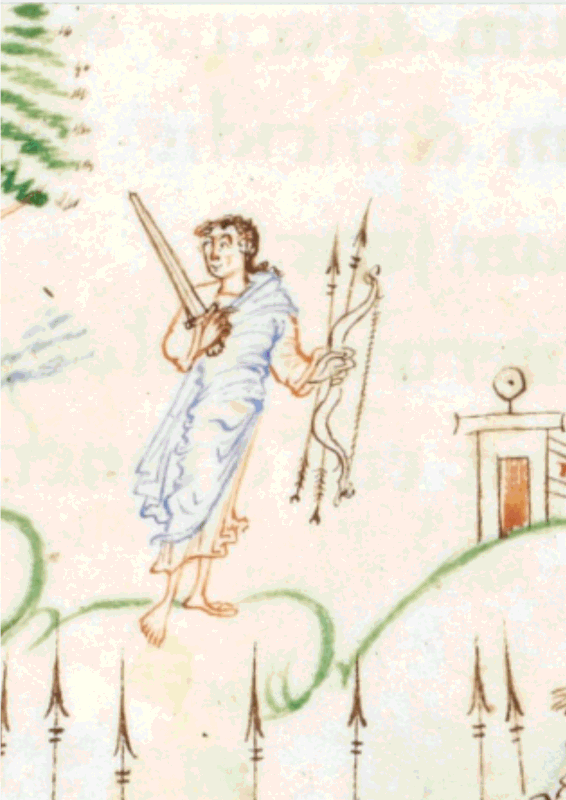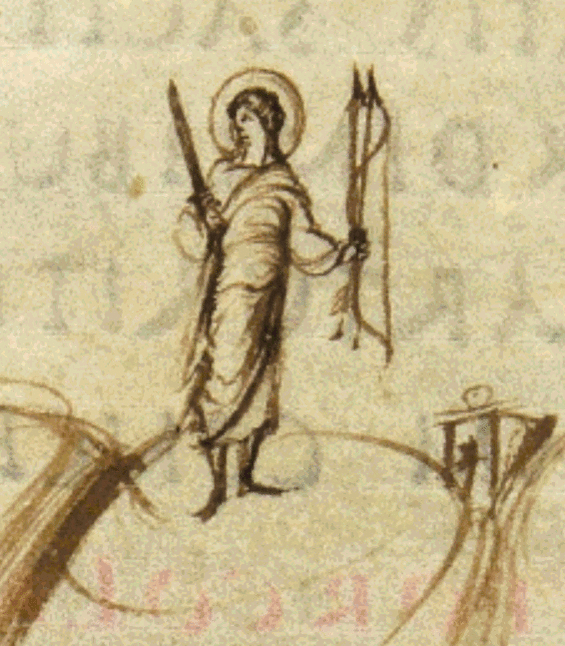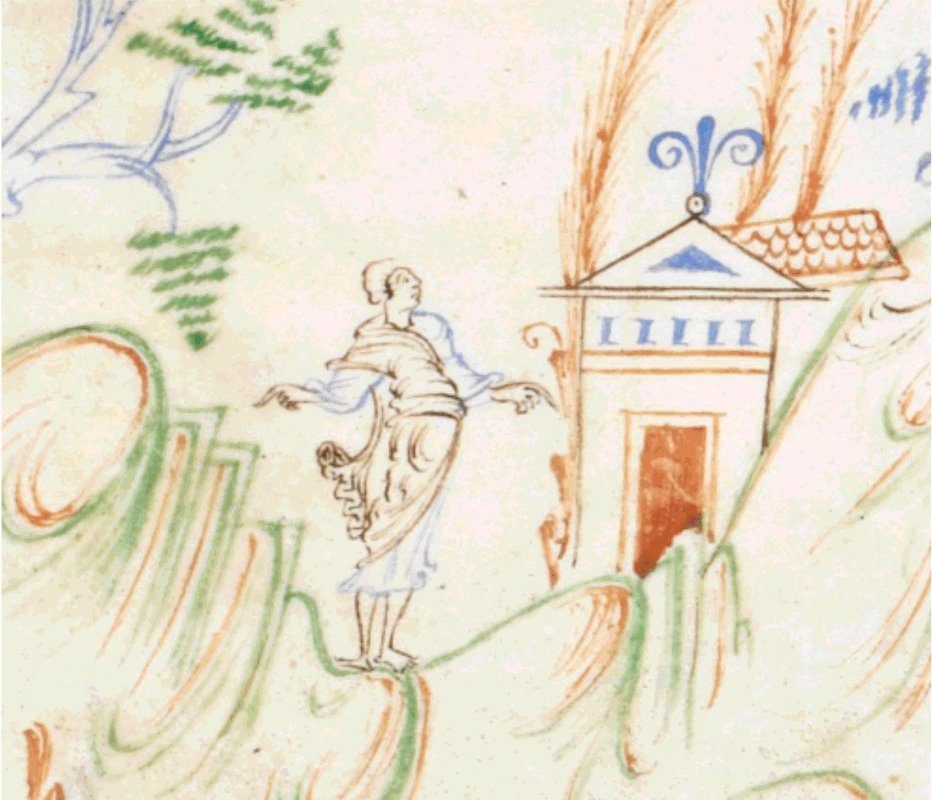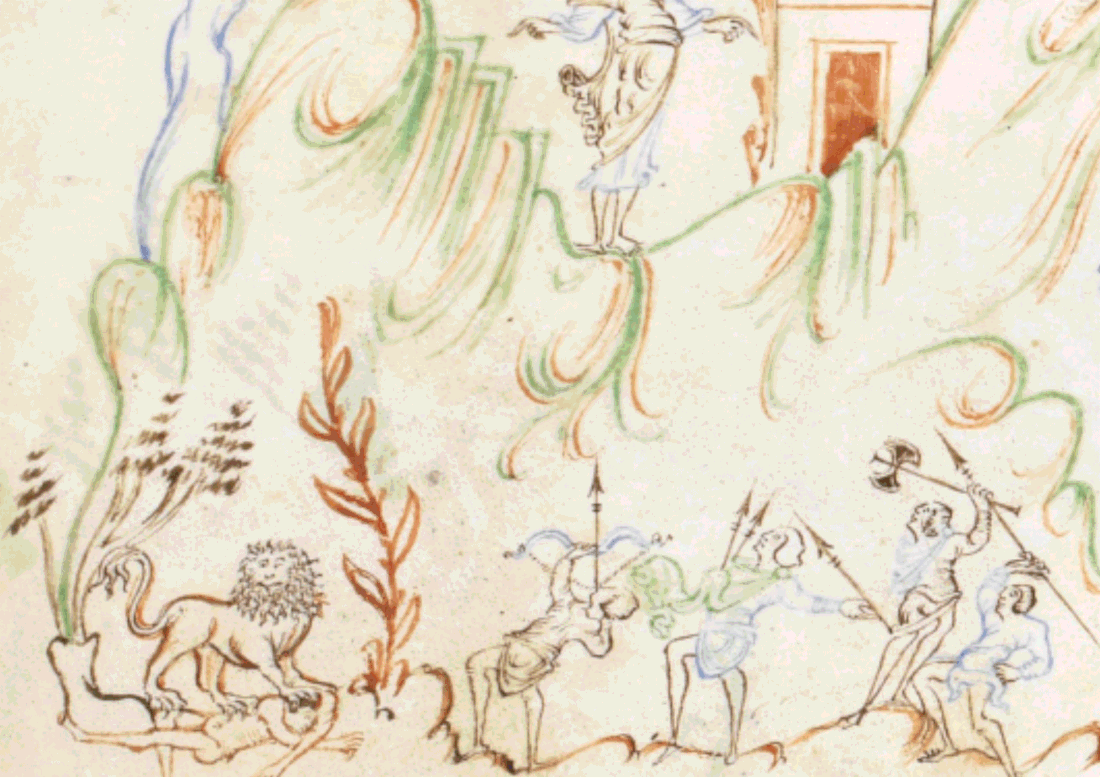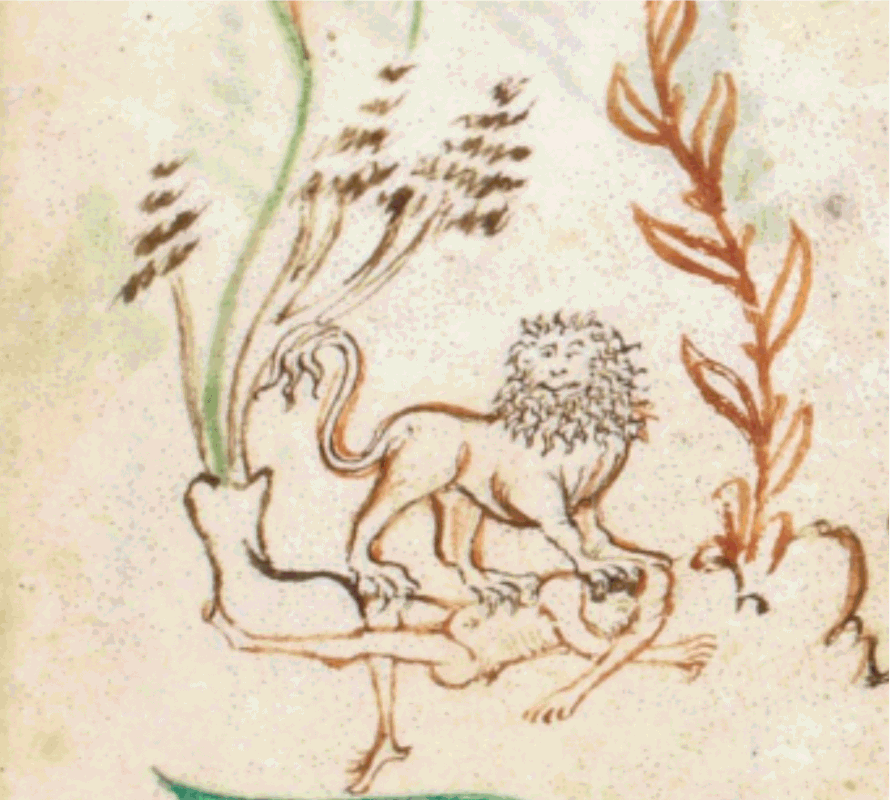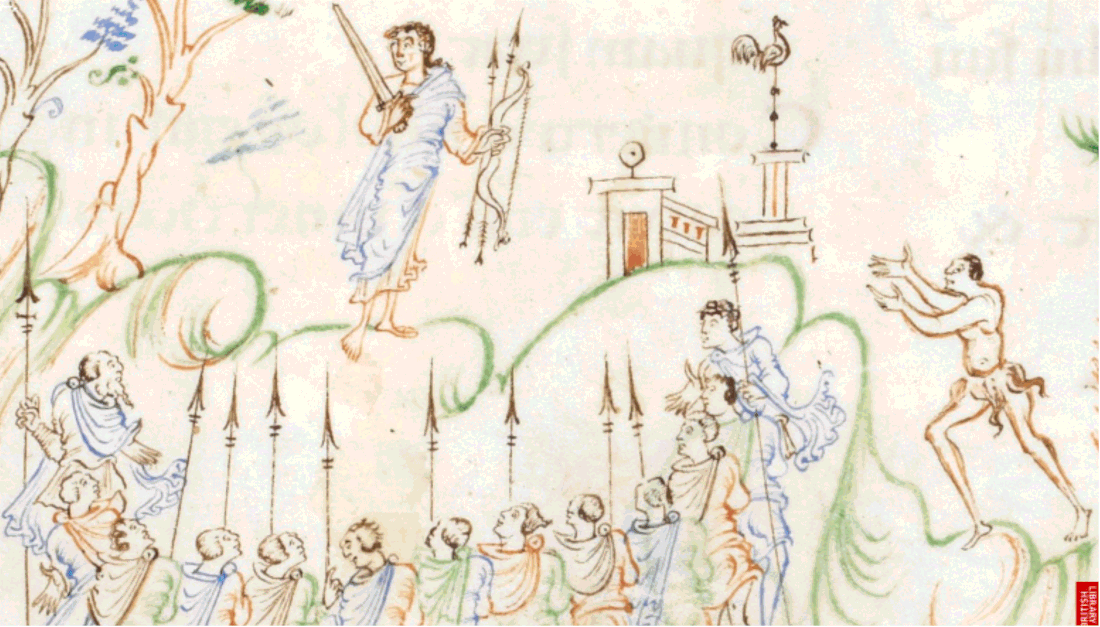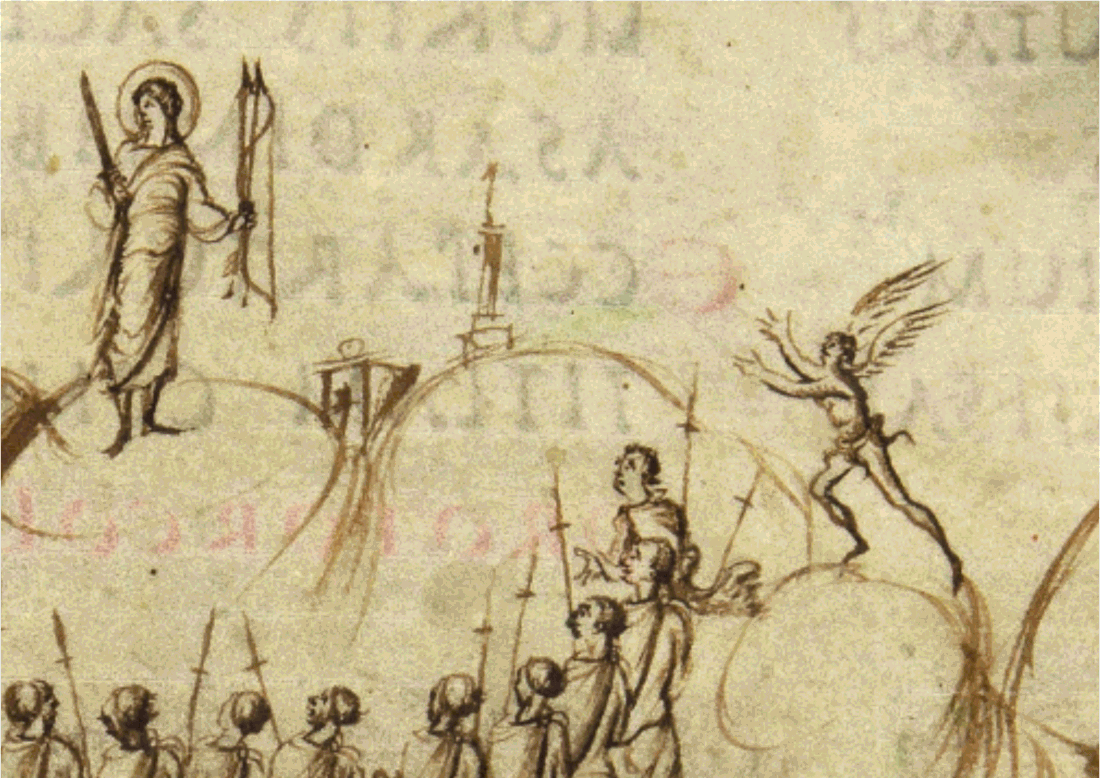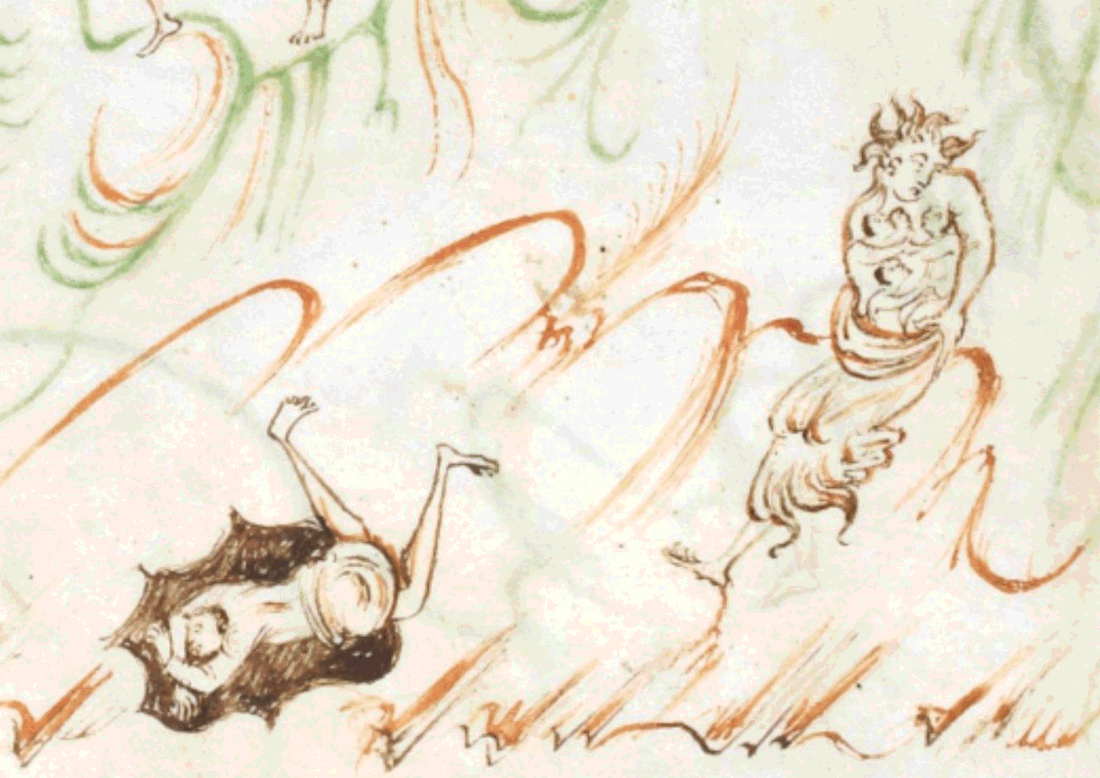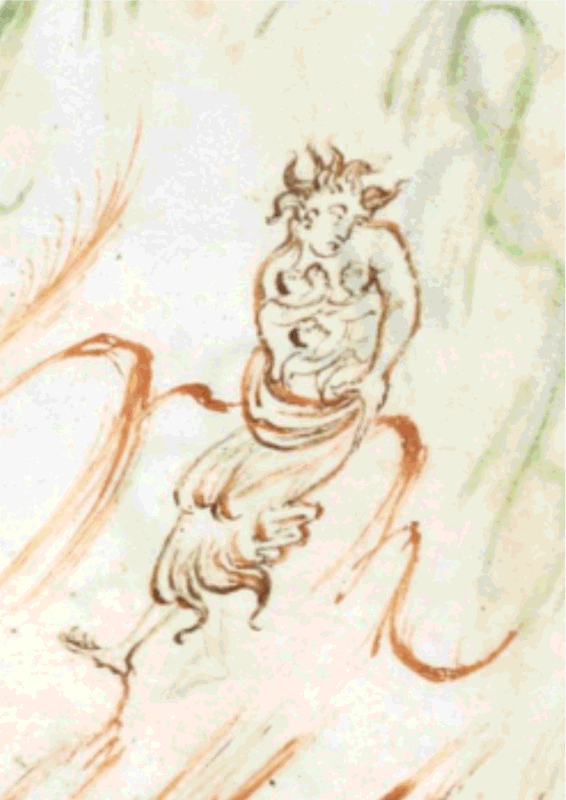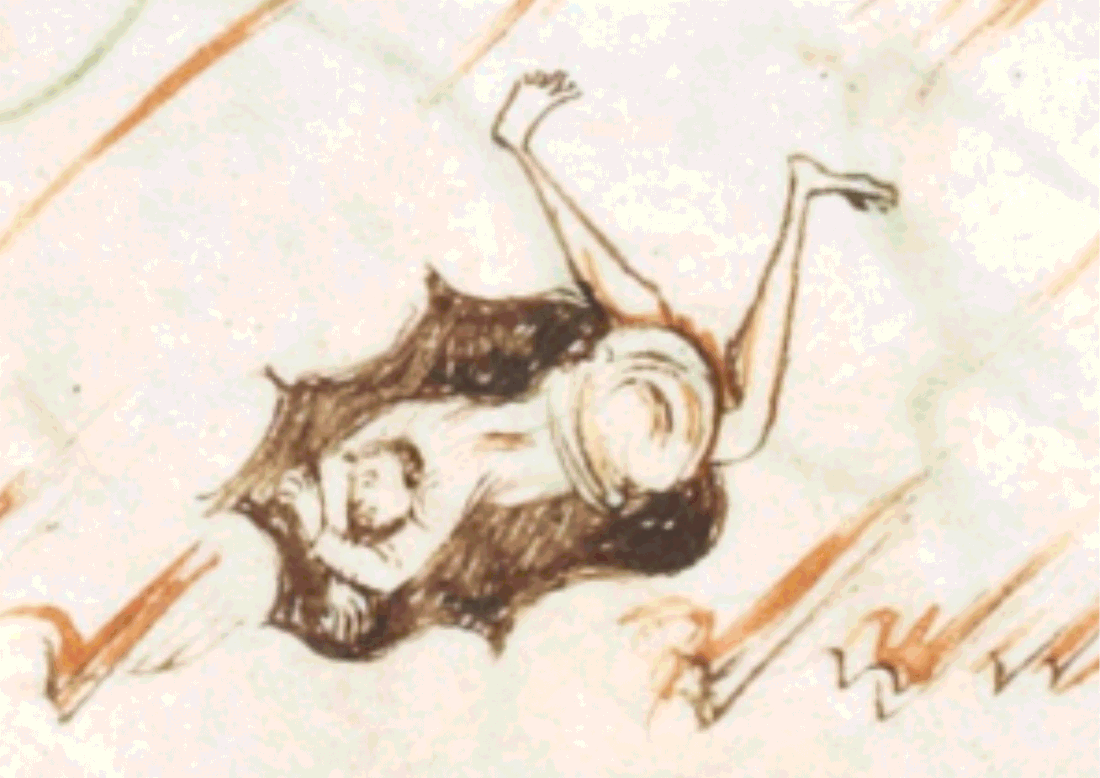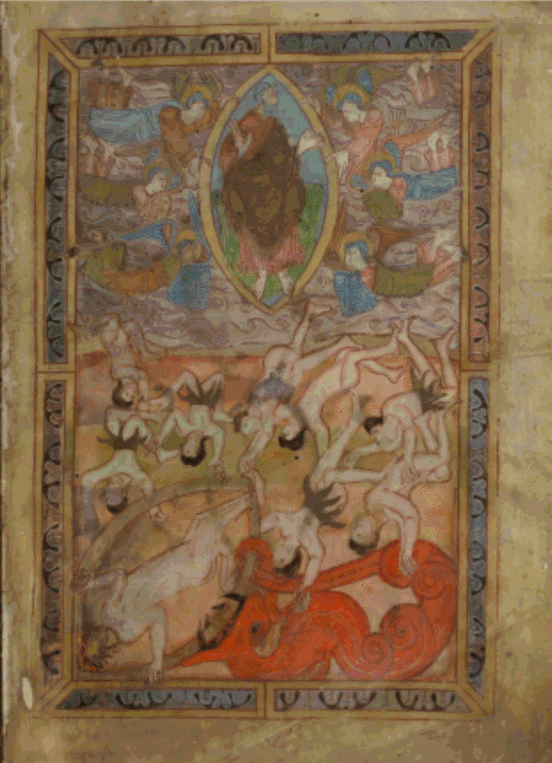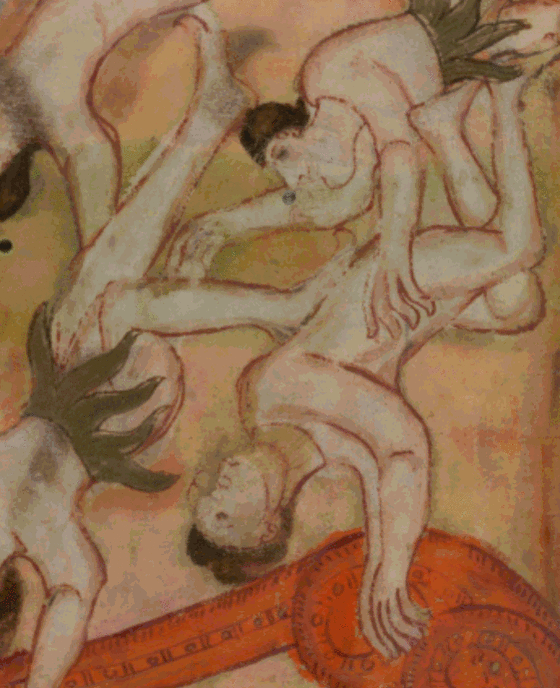|
The Anglo-Saxon Monk returns with more answers to the wondrous imagery of the Harley Psalter 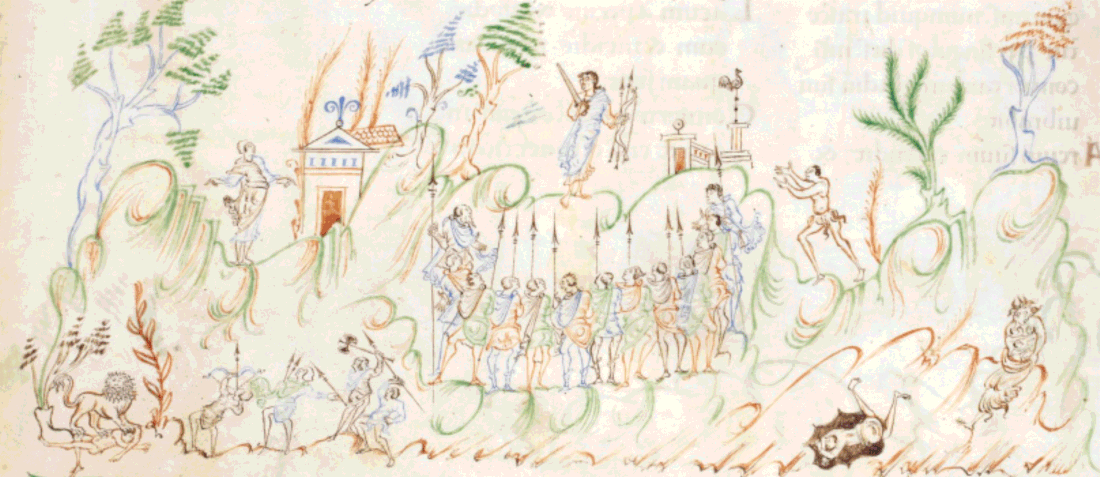 The Harley Psalter. © British Library Board. London, British Library, Harley MS 603, folio 4r. Click on the image to go to the online zoomable facsimile. All images of the Harley Psalter below are cropped details from this image of folio 4r, reproduced, with permission, from the British Library website. Blessed ones, I have returned, humbled (nay, humiliated) by your silence over my neglect of provision of spiritual nourishment in recent months. I beg your mercy and forgiveness. So, let me get straight to it. It's time for you all to engage anew with the holy Psalms, both visually and spiritually. Work out the clues in the charades scenes in the above image of the eleventh-century Harley Psalter, and you will have sufficient sustinance of spirit to last you, well, at least until my next post in this series. If you do need a refresher on the concept of medieval charades, just click here. But in essence, you are all to politely shout out the answers to the visual clues in the pictures, noting the correct answers as we go along, which will be underlined for your edification. Let's start where we should always start, with our Lord (top centre of the image on folio 4r). I know he doesn't look obviously Lord-like, but that's because the artist forgot to copy the nimbus, or halo, in the Utrecht Psalter model, as you can see from the image below. Mind you, the Utrecht artist forgot to put a cross in the nimbus, so he was only slightly less sinful. Such sloppiness just wouldn't be tolerated by my abbot, I can tell you! Back to the charades, blessed ones... I'm sincerely hoping you don't need much assistance in order to comprehend what the Lord is doing: yes, he brandish[es] his sword and hath bent his bow. Please don't disagree with me on the latter. The Lord has indeed bent his bow, but it was a few moments ago, it would seem, and now he is resting it a while. But, indeed, he made it ready. He's got his arrows, after all. But for what is this preparedness for violence? We shall see. The eagle-eyed amongst you will have recognised that the Lord is looking towards this fellow, the psalmist (he's in almost all the pictures of the psalter). Now the psalmist is looking back towards the Lord, but is also, yes, you noticed, pointing downwards with both hands. What a helpful charades player! On the right, the psalmist's left, we have a rather energetic foursome. You can see what they're up to, can you not? Arrows, spears and a rather splendid axe all aimed at our poor friend. You've got it, no? Why, they're the psalmist's nasty persecutors, of course, them that persecute me, as he puts it. Never trust any such fellows so scantily clad, is my advice, and if there are four of them, you absolutely know they're up to no good whatsoever. Shocking behaviour! As you can see, on our left, but his right, the psalmist also brings to our attention this rather marvellous lion and the unfortunate soul beneath its paws. Now, I beg you all to leave aside the lion's rather friendly disposition, evident in its somewhat anthropomorphised face, and please ignore its elegantly swishing tail that seems to be anticipating future use in heraldry, and instead gaze upon the overall effect on the fellow beneath. I'm quite sure, like me, you've quickly spotted this desperate individual's nakedness. Now, please, I implore you all once more: do not start thinking he's another one of those disreputable fellows who go about with their tunics hitched up to their nether regions. No! For this fellow is naked before God, which means just one thing, doesn't it? Yes? Come on now, I already slipped the answer in two paragraphs ago. He's a soul (souls are frequently represented as naked in medieval art): the psalmist's soul, to be precise. And so our psalmist is, quite understandably, pointing out his concern should the enemy seize upon [his] soul like a lion. The more spiritually adept amongst you may well be nodding sagely at this stage, recognising the Christian allusion to the devil as our adversary, walking around like a roaring lion seeking to devour someone (1 Peter 5:8). For those of you still wondering why this particular lion is smiling so benevolently, well, I throw my hands up in despair. Moving on... In this part of the illustration, I reckon you should pick up the visual codes with relative ease. Those beneath the Lord on high (notice he stands upon a lofty mountain, as is his wont) are indeed a congregation of people... well, men, in reality, but we're not going to quibble over an eleventh-century monk-artist's gender perceptions, are we now? Perhaps of greater alarm is the badly dressed fellow entering the scene stage left (our right). With those outstretched arms it looks rather like he's searching for something, does it not? No, I doubt it's the cockerel weathervane, just above him to the left, though it is rather splendid, I agree. No, it's something else, and we need to go back to the model image to work it out. Aha! Our Harley artist has been sloppy again. He's missed off this devil's wings – too preoccupied with his flight of fancy cockerel, perhaps. Let me, however, just say in his defence that the text actually doesn't mention any devil, or demon, just an enemy. So perhaps he was choosing to be less specific, and was quite happy to settle for a human in typical devil garb (you may remember how in the previoius psalm the devils are shown with raggedy skirts). But being as the Utrecht artist was clearly tapping into Christian imagery (and adding to the 'devil like a lion' allusion we discussed above), perhaps the Harley artist was amiss to drop the wings. But we must forgive him. Not so easy to forgive is both artists' positioning of the enemy. Surely by now it is clear the enemy intends to pursue [the psalmist's] soul. But he's miles off! "Over there!" I hear you all shouting. "Bottom left!" But perhaps we shouldn't be encouraging such nefarious deeds, even though, if you read the text in full (below), it becomes clear that it is the psalmist who asks of God that the enemy be allowed to pursue him. What a strange, contradictory fellow! Now to the final two clues, adjacent to each other on the page, and to my favourite parts of the charade imagery for this folio. Let's take first the badly coiffured woman on the right. What a miserable face! Mind you, three babes all at once; it's enough to drive anyone to despair. And that hair is a definitive sign of devilment, is it not? Another sure cause of misery, at the very least. Now, lying at the crux of this charade is understanding who her children are; so, any guesses of the children's names? No, not Shadrach, Meshack, and Abednego – wrong biblical story. And, no, not Snap, Crackle, and Pop – wrong century. Now, don't be silly, it is not the three Bee Gees, Barry, Maurice and Robin! Some seriousness, please! This woman has been in labour with injustice, conceived sorrow, and brought forth iniquity. So, Injustice, Sorrow, and Iniquity are the names. Obvious, really. You didn't get it? Maybe you'll do better with the final answer. What do we have here, then? He's another one of those fellows with exposed limbs, so the odds are he's dodgy. It's certainly unseemly to be flailing one's legs in such a debauched manner, I would say. What is he doing, do you think? Before you shout something ridiculous – like, he's lying on a sheepskin doing a spot of sunbathing – do take a look, by way of comparison, at the image below, taken from the contemporaneous Illustrated Old English Hexateuch. You've got it, haven't you? As with the Hexateuch figures being thrown out of heaven, our disreputable fellow in the Harley Psalter is falling. In fact, he hath opened a pit and dug it: and he is fallen into the hole he made. Granted, I don't see his spade, so we might have to take it as read that he's dug his own pit, or grave, we might say. Whatever, the case, you now know the importance of my title for this blog post: mind thine own pit, blessed ones! Well, what a lot of good, clean, spiritual fun we've had together. But I can hear some of you shouting, "But you've not explained what the Lord is doing, all ready with his bow and arrows!" Well, to conclude your spiritual sustinance, this very hour you must all now read through the entirety of Psalm 7, kindly reproduced below, where you will find the answer in verse 14. Any questions, just leave a comment below, and I will drag myself away from my many labours, and endeavour to respond with estimable longsuffering. May you be blessed. PSALM 7
1 The psalm of David which he sung to the Lord, for the words of Chusi the son of Jemini. 2 O Lord my God, in thee have I put my trust: save me from all them that persecute me, and deliver me. 3 Lest at any time he seize upon my soul like a lion, while there is no one to redeem me, nor to save. 4 O Lord my God, if I have done this thing, if there be iniquity in my hands. 5 If I have rendered to them that repaid me evils, let me deservedly fall empty before my enemies. 6 Let the enemy pursue my soul, and take it, and tread down my life on the earth, and bring down my glory to the dust. 7 Rise up, O Lord, in thy anger: and be thou exalted in the borders of my enemies. And arise, O Lord my God, in the precept which thou hast commanded. 8 And a congregation of people shall surround thee. And for their sakes return thou on high. 9 The Lord judgeth the people. Judge me, O Lord, according to my justice, and according to my innocence in me. 10 The wickedness of sinners shall be brought to nought: and thou shalt direct the just: the searcher of hearts and reins is God. 11 Just is my help from the Lord: who saveth the upright of heart. 12 God is a just judge, strong and patient: is he angry every day? 13 Except you will be converted, he will brandish his sword: he hath bent his bow, and made it ready. 14 And in it he hath prepared the instruments of death, he hath made ready his arrows for them that burn. 15 Behold he [the iniquitous person] hath been in labour with injustice; he hath conceived sorrow, and brought forth iniquity. 16 He hath opened a pit and dug it: and he is fallen into the hole he made. 17 His sorrow shall be turned on his own head: and his iniquity shall come down upon his crown. 18 I will give glory to the Lord according to his justice: and will sing to the name of the Lord the most High.
3 Comments
Excellent lessons, Brother Monk. I thank you for them.
Reply
The Anglo-Saxon Monk
12/12/2018 10:09:22 pm
It looks like we have a random time-traveller. May you be blessed, dear Kay, for you spiritual alertness.
Reply
Your comment will be posted after it is approved.
Leave a Reply. |
Details
|

